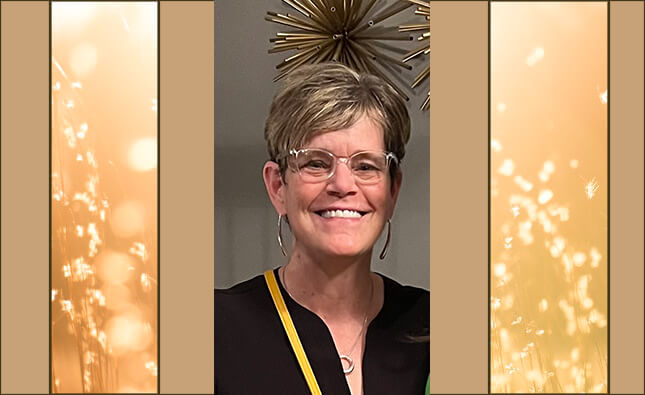
How long have you been coming to MOI events?
I met Johnathan in 2014 and have been involved with MOI in one way or another ever since.
How did you get interested in meditation practice?
I saw a flyer for a class called Basic Mindfulness and was drawn in by a line on it that said “At the core of this practice is the relief of suffering.”
Share a memory or feeling you have about MOI.
One of my all-time favorite memories came at the end of an MOI class I was teaching with Anne at the Douglas County Correctional Center when one of the inmates dubbed us “the cucumber water of the jail.” 🙂
What does your meditation practice look like?
I begin each morning by offering lovingkindness to the first person who enters my mind. I try to sit a minimum of 30 minutes a day. I end each day writing down and reflecting upon 10 things/moments/people/etc. from that day for which I am grateful.
Share a favorite quote, mantra, intention or saying that is currently guiding you in practice.
“Right now, it’s like this.” ~Vinny Ferraro and Whenever you have the impulse to be generous, act on it.
What is your definition of sangha?
A group of like minds with whom to be in community and to learn, share, and grow in the Dharma.
Name a book on the dharma that you consider a must read.
After the Ecstasy, The Laundry by Jack Kornfield
What are you currently working with in your practice?
Letting go
What has mindfulness and/or mediation helped you with?
So much, but to name a few: changing my relationship to experience, making the Four Brahmaviharas a way of life, cultivating gratitude, responding rather than reacting, seeing the good, expanding my understanding and practice of generosity, letting everything be my teacher, accepting what is, and on and on.
Tell us about one success story you have had on your dharma journey.
In my introduction to the practice–the Basic Mindfulness class–our homework for week two was to name either anger or resentment every time it arose that week. We were not to attach a story to the emotion or react to it–just note it and then let it go. I left the class not even knowing which one I would choose but called the friend I was taking the class with from my driveway after the 20 minute drive home from class and said “I have noted ‘resentment’ 9 times already.” Thus began my journey. Bringing awareness to, observing, naming, and changing my relationship to emotions was (and continues to be) a game changer for me.
Tell us about one challenging story you have had on your dharma journey.
I’ve had to learn (and am still struggling with) the difference between fierce compassion and blind compassion. As Sharon Salzberg illustrates in the following story from her book Lovingkindness in which she is riding with a friend in a hand-drawn rickshaw through the streets of Calcutta: The rickshaw man took us by shortcuts, through dark streets and down back alleys. At one point, suddenly out of nowhere, an extremely big man approached the rickshaw driver and stopped him. Then he looked at me, grabbed me, and tried to pull me off the rickshaw. I looked around the streets for help. There were a lot of people everywhere, as there often are in India, but I did not see a single friendly face. I thought, “Oh my God, this guy is going to drag me off and rape me. Then he is going to kill me and nobody is going to help me!” My friend who was sitting with me in the rickshaw managed to push the drunken man away and urged the rickshaw driver to go on. So we escaped and got to the station. I was very shaken and upset when we arrived in Bodh Gaya. I told Munindra, one of my meditation teachers, what had happened. He looked at me and said, “Oh Sharon, with all the lovingkindness in your heart, you should have taken your umbrella and hit that man over the head with it!'”
Finally, what are some of your other interests outside of the dharma?
Connecting with friends, laughing, reading, and hanging out with my dog Ruthie (aka RBG)
Thank you, Katie! We are so happy you are a part of MOI’s sangha!
